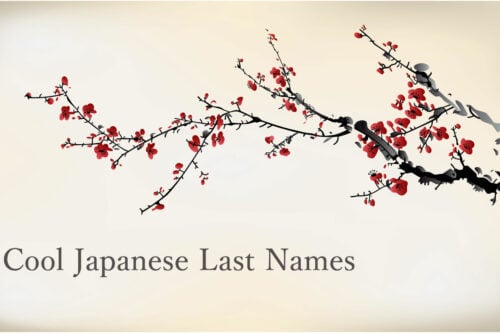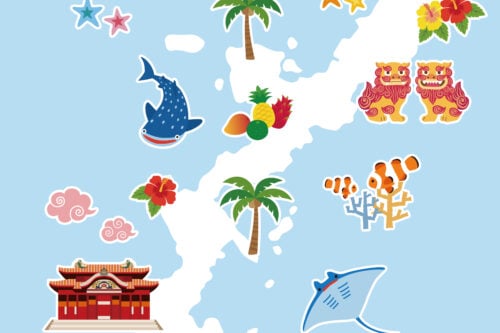Share on your favorite
Or copy the link
Below are navigation links that will take you to the main text and navigation menus.
26,551 first names, 70,620 last names, 333,585 kanji variations.
one of the best Japanese name search tools for your baby!

In Japan, the top 10 most common family names account for approximately 10 percent of the Japanese population. You may have heard of these most common family names such as 佐藤(Satō), 鈴木(Suzuki), 高橋(Takahashi).
Also, many rare family names have been used by less than 100 people. Besides, there are more than 10,000 different family names that are extremely unique.
Contents
Many rare family names are used by less than 10 people in Japan. At first, we have selected out 10 of them for you. Have you heard of them?
I am sure you have heard of those family names because the family names are also used as a place name in Japan. In addition to surnames of prefectures, city names and small-town names can also be someone’s surnames. “Tōkyō” seems to be another very rare name, with about 10 people in Japan.
In some cases, food ingredients that we often see in our daily lives are given surnames. The pronunciation is the same as that of the food.
We can’t even imagine how to read these names from the kanji.
The meaning of “四月一日” is “1st of April”. This pronunciation comes from the fact that the cotton was harvested in April. “A cotton (Wata) is taken (Nuku) on the 1st of April” has become the surname, “Watanuki”.
The meaning of “八月一日” is “1st of August”. The pronunciation comes from the custom of picking rice plants on the 1st of August. “A rice plant (Ho) is picked (Tsumu) has become the surname, “Hozumi”
The meaning of “九十九” is “Ninety-nine (99)”.
The “百 (hundred)” is pronounced as “momo” as well as “hyaku”. It was also called “Tsugi (next) momo” because the next number after “九十九(99)” is “百(100)”.
The word “Tsugimomo” was shortened to “Tsukumo”, which is the origin of the name.
The meaning of “九” is “Nine (9)”.
The single letter “九” is read as “Ku”. So it has become to be read “Ichijiku”. (“Ichiji” means a single letter, “ku” means “九 (nine)”.
The meaning of “小鳥遊” is “A little bird is playing”.
In this case, “A little bird is playing” means “No natural enemies (hawks)”. So the name is a wordplay that means “No (Nashi) hawks(Taka)” = “Takanashi”
The traditional family names in Japan are associated with kanji. There is no such thing as a hiragana-only or katakana-only family name. However, there are a small number of surnames with hiragana or katakana.
This “タ” is very similar to the kanji of “夕”, but in this case, the “タ” is katakana.
The longest Japanese surname is the one with five letters in kanji. Currently, there are only two types of surnames. Each is said to have about 10 people in Japan today.
It is said to be used mainly in Yamaguchi Prefecture.
It is said to be used mainly in Saitama Prefecture.
There are too many other unusual family names in Japan to list them all here.
They say that there are 300,000 types of Japanese family names in Japan. There are many unusual surnames, some of which are so rare that only a single-family exists. When you meet a Japanese person, pay attention to their last name. If the person has a rare name, you would be surprised to know that there is such a thing as a family name?




Sort by: Most Relevant
Sorts names by how closely they match your search meaning. Names containing more kanji that match your search terms appear higher in the results.
Sort by: Most Kanji Variations
Sorts names by how many different kanji spellings they have. In general, names with more variants tend to be more familiar and widespread in Japan (with some exceptions).
Sort by: Most Viewed
Sorts names by page views on this site. Views reflect global traffic (including Japan), so this does not represent popularity among Japanese people only. A high view count does not necessarily mean the name is famous in Japan.
What is Hiragana?
Hiragana is one of the two Japanese syllabaries. Each character represents a sound (mora), not a meaning. It is used for native words, grammatical particles, verb/adjective endings (okurigana), and to show pronunciation above kanji (furigana). It developed from cursive forms of kanji.
What is Katakana?
Katakana is one of the two Japanese syllabaries. Each character represents a sound (mora), not a meaning. It is mainly used to write foreign words and names, loanwords, onomatopoeia, and for emphasis.
What is a Kanji Idea?
Kanji are Chinese characters used in Japanese writing. Unlike katakana and hiragana, each kanji character carries its own meaning.
When we convert your name into kanji, we select characters whose sounds match the Japanese pronunciation of your name, while also considering the meaning of each character. The result is a unique combination of kanji that both sounds like your name and carries meaningful symbolism.
We refresh the kanji combination each time you visit, so you can discover different options. If you find one you like, save it to your favorites!
What are English Syllables?
A syllable is a unit of pronunciation in English — it’s the beat you hear when you say a word.
Here are a few quick examples:
cat = 1 syllable
ba-by = 2 syllables
beau-ti-ful = 3 syllables
On this site, English Syllables show how a name naturally breaks into sounds when spoken in English. This helps you understand how English speakers naturally say the name and where they pause between sounds.
What are Japanese Morae?
A mora (plural: morae, Japanese: 拍 Haku) is the basic unit of sound in Japanese — think of it as one rhythmic “beat” when speaking.
Here are a few quick examples:
あ (a) = 1 mora
あい (a-i) = 2 morae
きょう (kyo-u) = 2 morae
On this site, Japanese Morae show how many “beats” a name has in Japanese. Most Japanese names have about 2–4 morae, which affects how natural and rhythmic the name sounds to native speakers.
This helps you see how the name fits into the natural rhythm of Japanese speech.
What is English Transcription?
“English transcription” (romanization) is the romanized form of a Japanese name, intended to reproduce its pronunciation as closely as possible. It is also useful for searching names on this site.
Japanese-Style Nicknames
In Japan, nicknames are used to express familiarity and affection. Typical features include:
Shortened forms: Names are often shortened for closeness, e.g., “Yuki” from “Yukiko” or “Taka” from “Takashi”.
Suffixes: Terms like “-chan” (often for girls, also for young children) and “-kun” (often for boys) are used among family and close friends. Among very close adults, “-chan” may still be used. More details
Use & context: Nicknames are informal—common among friends, family, or close colleagues—and are not suitable for formal or professional settings. Their use implies a certain degree of intimacy.
Long vowels: The long vowel mark “chōonpu” (ー) extends the preceding vowel. For example, “あーちゃん” (A-chan) lengthens the “あ” sound.
Households
Sorts surnames by the estimated number of Japanese households that use them. More households generally indicates a more common or well-known surname.
About our last-name data

Success
Migration completed successfully!